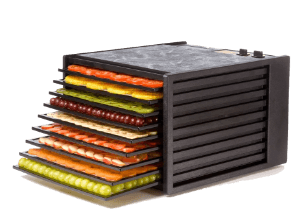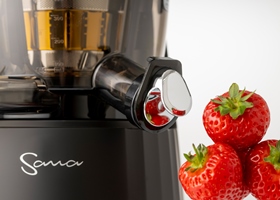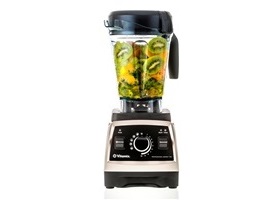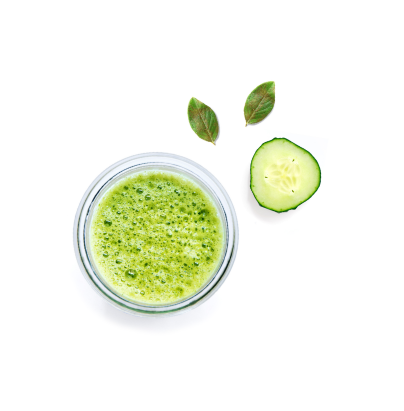Why We Don’t Sell Cheap Chinese Slow Juicers
Chinese Manufacturing
So much of our stuff is made in China now that it’s almost inescapable. Maybe your phone, your TV, many of your tech gadgets, even some of your furniture could be made in China. There’s been an exodus of manufacturing to China in many industries and when global companies move their manufacturing base there they work closely with the Chinese to set up factories and oversee production and quality right down to the finest detail. In many of these cases, China is capable of true excellence. We have several excellent Chinese made products in our range already; Sage Juicers for example. But this article is not about that kind of collaborative manufacturing.
There’s another side to Chinese manufacturing that many of us are also familiar with and that’s their prolific tendency to copy existing products and concepts. When some smaller Chinese manufacturers produce lookalike products, they sometimes get it right with the way an item actually looks, but they have been known to get it horribly wrong with quality and the way it performs. We’ve been approached by many Chinese exporters offering us products over the years and many of the samples we’ve looked at have not been fit for the level of quality that we prefer to offer our customers.
Most of the original high quality examples of low speed Masticating Juicers currently available originate from high tech manufacturers based in South Korea, a country renowned for the quality of its engineering. Single Auger and Twin Gear Masticating Juicers were originally developed there. We trust Korea to manufacture our cars and build our ships, and their success in the manufacture of cutting edge technology has given them world leader status. Korean manufacturers offer genuine support for their extensively tested products and have independently verifiable quality standard accreditation. They are used to dealing with renowned western brands and meeting western expectations and they tend not to cut corners. With some notable exceptions, that is not always the case with exclusively Chinese products. It can be a confusing picture because some Korean manufacturers as well as western ones do collaborate very successfully with Chinese factories.
Imitation Is The Sneakiest Form of Flattery
There are fewer barriers to Chinese imports in today’s truly global marketplace and many Chinese exporters and trading companies find it easy to offer almost identical copies of established manufacturers’ concepts and sell them to businesses worldwide. Apart from lower overall production costs, the Chinese version has no research and development costs to recoup, because they’ve simply taken the concept that someone else has already invested in developing and duplicated it, as best they can. Such suppliers might make small adjustments to designs, possibly in the hope of making their juicer just different enough to evade intellectual property law suits.
Genuine Chinese manufacturers, who care about quality (not to be confused with Chinese trading companies who are basically middle men) don’t take this approach. They are equally as careful as manufacturers in other countries when it comes to observing intellectual property and will develop products that are indistinguishable from the rest of the world’s output in terms of quality. Unfortunately it can sometimes be difficult for the consumer to tell the good from the bad. If you are looking at a slow juicer costing less than half the price of most well known brands, you may be looking at a less than excellent juicer from a small Chinese maker who is trying to make it big by taking shortcuts. At UK Juicers™ we have our own ‘man in China’ who is also a trusted Chinese friend – he is quick to warn us of the kind of practices that can happen, like fake European safety certification, or substituting cheaper components after sending a better quality sample of what the buyer might expect to receive – the list goes on.
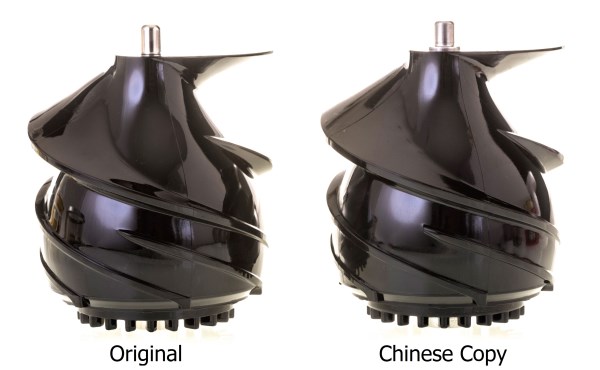
How Do They Get Away With It?
It can be very difficult for manufacturers to protect their intellectual property rights against Chinese imitators. Some don’t even bother to try, or leave it too late, and in those cases you might think that’s their mistake for being so careless. It’s often uneconomic to try to prosecute a manufacturer directly, so in the case of some intellectual property violations it is the sellers further down the line that might find themselves getting the nasty surprise of being sued. (We’ve seen this happen with a well known manufacturer going after sellers of copies outside China).
Many potential breaches go unchallenged simply because the cost of pursuing damages across multiple borders is too high. Some of our reputable suppliers of high quality juicer brands are very worried about the losses they have suffered because of lookalike Chinese products. New name badges appear on these cheap juicers with such regularity that its hard to keep up and the same Chinese juicer can often be seen with several different names, on several different websites. Cheap Chinese lookalike products can also fuel early obsolescence for the branded models that they imitate, as the original manufacturers keep re-skinning and updating their juicers to stay one step ahead of the inevitable Chinese copies that will arrive on the scene to prey on their sales.
Parasitic Marketing
Original slow juicer designs by Korean factories have been widely copied in China, right down to some parts being so similar that they are interchangeable with the originals. Whatever moral argument there may be, many of these copies are legally legitimate because there are no intellectual property rights being breached, but that doesn’t remove the issue of widely varying quality that the consumer may not easily detect.
These imitators are sometimes easy to spot and sometimes not so easy. You may find that when someone has decided to put a new brand name on a Chinese model, they are often only offering that one brand of juicer for sale, rather than a range of products from multiple brands. They will often make false claims about the products they offer, with unfair comparisons to well known brands.
Such sellers often advertise on google naming the original brands and inviting the consumer to buy a their brand instead. This ‘don’t buy that buy this instead’ strategy is known as ‘Parasitic Marketing’ in the trade – a term that seems very appropriate. These products often have a massively cheaper factory gate price than the original brands they are stealing sales from, but that saving is not passed on to the consumer, giving these ‘parasites’ a huge advertising budget from their massive profit margins. With profit margins that we would consider obscene, they can then feed off the original brands, using parasitic marketing tactics to suck away sales from the host. We named one of these ‘parasites’ in an earlier version of this article and they didn’t like it at all, threatening to use some of their massive profit margin to take us to court!
What’s Wrong With Buying Cheap Chinese Slow Juicers?
There is nothing wrong with looking to save money by buying a cheaper juicer. Even if you are untroubled by the moral argument against the lower quality imitators cashing in on the product development investments of the original brands, there are still a number of other things to consider in terms of real value for money.
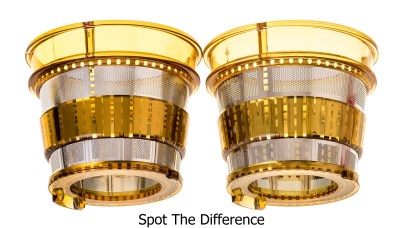
We wouldn’t suggest for a moment that Chinese juicers are generally bad. China makes some great products as we said earlier and when a juicer brand in the west collaborates closely with a Chinese factory the results can be excellent. Sage Nutri Juicers are an excellent example of what happens when there is collaboration with high quality Chinese manufacturers and we are happy to offer such products to our customers. However, we’ve received many samples of exclusively Chinese juicers over the years and the difference in quality is often immediately obvious to us, so even if we were untroubled by potential issues over the design, to date we still don’t see many of them as representing the long term value that we strive to offer our customers.
The plastics in some samples we’ve received feel thinner and cheaper and they might be spray painted instead of manufactured from different colours of plastic in the first place. We once had a Chinese juicer sample sent to us that immediately started to melt its own wiring when we plugged it in. As pointed out at the start of this article, fake European safety certification is another problem that can be an issue with some Chinese traders. The motors can be noisier in some cases, with more vibration, and in our opinion the lifespan of these cheaper products is unlikely to match that of the type of high quality juicers that originate in South Korea, or from genuine western standard manufacturers in China.
The motor is the beating heart of your juicer and you want a good quality example. Some of our customers come to us to upgrade when their Chinese made juicers have broken down after a relatively short lifespan. It’s unsurprising to us that customers who’ve been let down by cheap juicers in this way are often also very aggrieved by the service they’ve received when they sought redress with the seller. Are the guarantees offered by such sellers likely to be any more than a marketing ploy that can be avoided with the ‘fair wear and tear’ or ‘user error’ argument later on? Will the brand still be around for you to contact when their cheap juicer fails, or are they a ‘flash in the pan’ operator out for a quick profit? Can you get telephone support from the seller? We think these can all be valid consumer concerns when choosing a juicer and time and again we’ve spoken to people who’ve been burned by less scrupulous sellers. A lot of the worst offenders are available on Amazon and even finding out how to return a product to Amazon, or get some phone support, can at times seem like a Sisyphean task, so many customers of these rip off brands tend to just accept that they’ve been fleeced.
In our opinion the old saying ‘buy cheap and buy twice’ can be applied to a lot of the Chinese Slow Juicers out there and its worth doing some research. Is the company a ‘One Brand Wonder’ exclusively offering only a single brand name that is not available anywhere else? If they are, you might wonder if they are best placed to offer advice or comparisons to other brands. Do they have a bricks and mortar presence in the UK – an actual office and their own warehouse, where help is available in normal working hours? Have you looked up their UK address on google streetview? Are they listed by google business? Do they stand by their reputation by subjecting themselves to completely independent customer service review processes? Can you get to speak to someone in the UK to seek product advice, rather than through a chat window that can be accessed anywhere in the world?
We can’t name names here but we’re happy to let you know the worst offenders if you give us a call. In many cases we have already tested the models concerned and we will happily stake our reputation on also pointing out that in many cases, the juicers just don’t give good enough results.
UK Juicers™ will never leave you high and dry after your purchase and we guarantee to offer only the very best juicers to our customers, whatever the country of manufacture. We also know that even the best brands of juicers can sometimes suffer failures and if that happens with one you have bought from us, we are right here to help when needed. Perhaps that’s why we have a 5 star customer service rating on Trustpilot®
 Register / Login
Register / Login 





